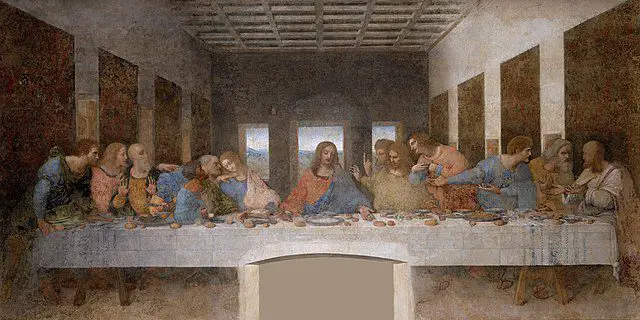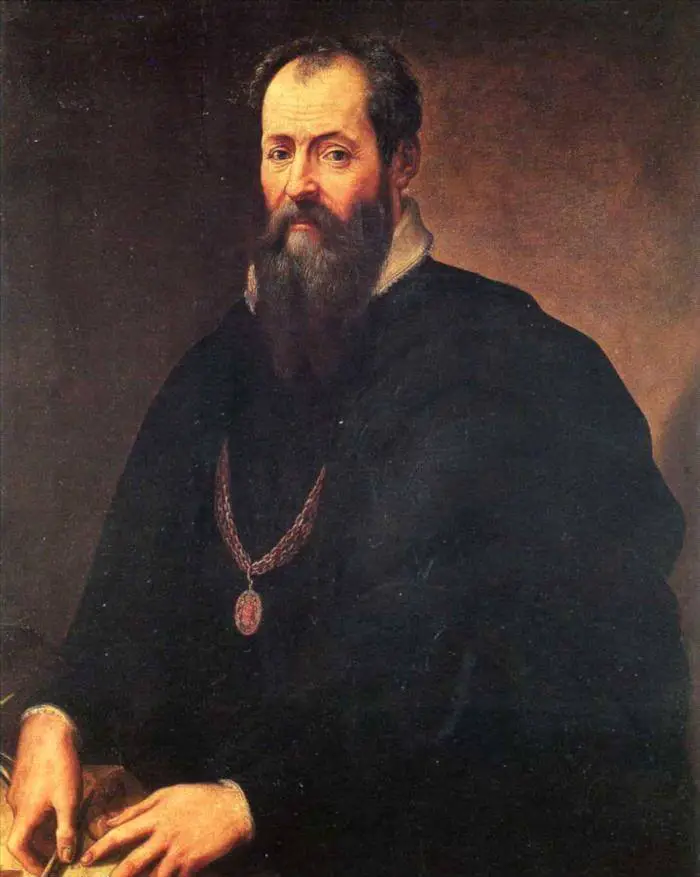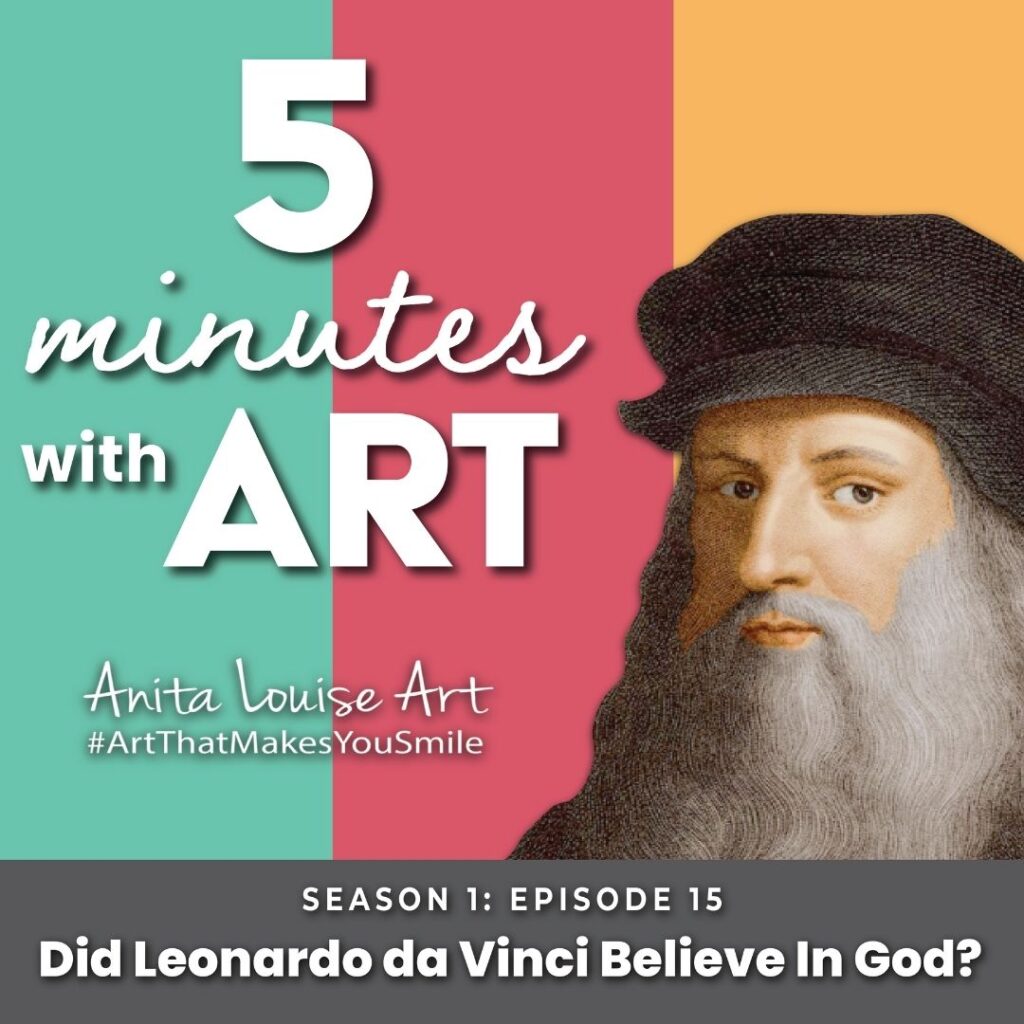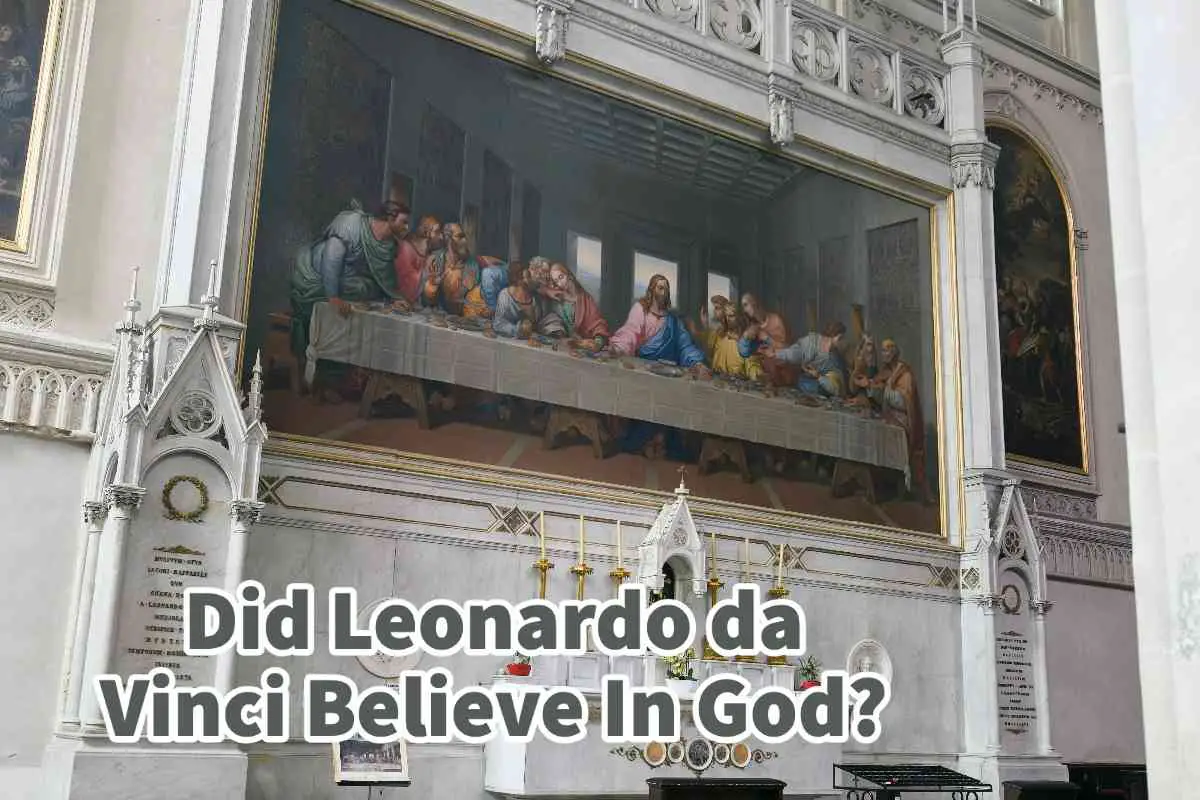We do not know much about Leonardo da Vinci’s personal life. He left us thousands of writings but not much about his personal life or beliefs.
Leonardo did not tell us what his belief in God was, but there is evidence that is left that suggests that he held fast to many Christian ideals and beliefs. People such as the artist and author Giorgio Vasari, who knew and wrote about him, spoke of his character and what a great man he was.
Table of Contents
- Leonardo da Vinci And His Belief In God
- Leonardo’s Personal Character
- Leonardo da Vinci, Religion, Humanism And Renassiance Era
- 11 Reasons Leonardo da Vinci’s Genius Shines Bright in the Art World
- Frequently Asked Questions
- Related Questions
For Leonardo to paint the Last Supper as he did, he would have had to study the Bible and fully understand its meaning and story. He would have had to learn about the lives and personalities of Christ’s twelve apostles.
Leonardo da Vinci And His Belief In God
Leonardo da Vinci left no writings or evidence about his personal beliefs in God. We have very little personal information about him in his writings.
Most of what we have that is personal is what others have written or observed about him.
But no evidence shows that he did not believe in God; on the contrary, there is much evidence that he did. We can only speculate about this as we have no proof of whether he believed in God, but I think he did.

First of all, he understood Christ, the apostles, and human character. This is evident in this Last Supper painting and how he showed the personality of each of the apostles.
To be able to paint that painting, he would have had to have studied the writings of the Bible and learned about the lives of the apostles. Because he understood them so well, this painting continues to be a religious masterpiece.
We know his character and the kind of man the other person said he was. From his character and what others saw of him, others considered him to have many “good Christian attributes.”
Leonardo’s Personal Character

Many of the early biographers, such as Giorgio Vasari, who personally knew Leonardo or knew people who knew him, described Leonardo da Vinci as a kind and generous man. He was well-liked in the community and was considered a great conversationalist with charm and wit.
Vasari said this about Leonardo and how others saw him:
… his magnificent presence brought comfort to the most troubled soul; he was so persuasive that he could bend other people to his will. … He was so generous that he fed all his friends, rich or poor… Through his birth Florence received a very great gift, and through his death it sustained an incalculable loss.
Giorgio Vasari – Lives Of The Most Excellent Painters, Sculptors and Architects
In the normal course of events many men and women are born with various remarkable qualities and talents; but occasionally, in a way that transcends nature, a single person is marvellously endowed by heaven with beauty, grace and talent in such abundance that he leaves other men far behind… Everyone acknowledged that this was true of Leonardo da Vinci, an artist of outstanding physical beauty who displayed infinite grace in everything he did and who cultivated his genius so brilliantly that all problems he studied were solved with ease.
Leonardo’s peers knew him to be kind, generous, witty, giving, compassionate, and “full of grace.” He was well-liked and highly respected for not just being an artist but also for his character. Leonardo seems to have the Christian virtues of charity or giving to those with less than he had.
While painting the Last Supper, Leonardo did write about some of his thoughts. Those thoughts can also help to give us some insight into his character and what was important to him:
“Wine is good, but water is preferable at table. … Small rooms or dwellings set the mind in the right path, large ones cause it to go astray. … If you want money in abundance, you will end by not enjoying it….He who wishes to become rich in a day is hanged in a year.”
Leonardo da Vinci
We learn from this quote that Leonardo believed in many ways in a simple life, which would have also been an attribute of a Christian ideal. He also spoke of the “evil of money,” which has long been a Christian belief.
Leonardo da Vinci, Religion, Humanism And Renassiance Era
In the Renaissance era, the Catholic church was still the driving force for religion, especially Italy. As Leonardo lived in Italy and was Italian, he would have been influenced by the Catholic church.
The Renaissance era affected the city of Rome, the Catholic church, and even the Popes. The Renaissance brought great art patronage, especially from the Catholic church, but it was also an era of change for religion.

Listen To Our Podcast About Did Leonardo da Vinci Believe In God? by clicking here.
There was a movement in the Renaissance era known as Humanism. Humanism was an intellectual movement focused not on religion but on what it was to be human. The origins of Humanism go back to the 14th Century Italy.
Humanists believed in the importance of education in classical literature and the promotion of civic virtue. Humanists believe in their full potential for their good and the good of society.
During the Renaissance, the main Humanism thought included:
- An interest in studying literature and art, in particular from antiquity as Greece and Rome
- Use of Latin and a combination of literary studies, history, and linguistics.
- Believed in education and that education can help society.
- Considered in both private and civic virtue.
- Understanding non-religious studies was essential and encouraged them.
- An emphasis on the importance of observation, critical analysis, and creativity.
- A belief that poets, writers, and artists could help lead people to a better life and understanding.
- A deep interest in the question of what it means to be human.
When we look at these points, I can see how Leonardo could have been interested in the Humanism movement that started during the Renaissance. After all, he was a forward thinker.
The humanists believed in Christianity and God; it was a movement that led the way for the future Protestant Reformation.
Leonardo da Vinci was Christian, and he believed in God. There is no evidence to show that he did not; in fact, there is a lot of evidence from those who knew him and his writings that he was religious.
During his lifetime, almost everyone would have at least been or shown to be religious. The Catholic church had a lot of control over individuals during this time. People would have attended church as it was cultural and part of the government. Leonardo da Vinci would have been no different.
11 Reasons Leonardo da Vinci’s Genius Shines Bright in the Art World
Leonardo da Vinci, a name that has resonated through the corridors of time, remains synonymous with art, innovation, and unparalleled genius. Often hailed as one of the greatest artists in history, Leonardo’s legacy stretches far beyond his paintings. Here are eleven compelling reasons that celebrate his timeless magnificence:
- Multifaceted Talent: More than an artist, Leonardo was a polymath. His interests spanned anatomy, engineering, botany, and more. This vast knowledge enriched his artworks, making them a fusion of art and science.
- Innovative Techniques: Leonardo introduced groundbreaking techniques like sfumato, which involves the delicate blending of colors and tones to create soft edges, lending his portraits a dreamy, lifelike quality.
- Masterpieces Galore: Works like the “Mona Lisa” and “The Last Supper” aren’t just famous—they’re iconic. These masterpieces have become global symbols of art, setting standards for artistic brilliance.
- Anatomical Precision: Leonardo’s meticulous human body studies led to unprecedented accuracy in his depictions. His sketches from dissections revealed insights that were way ahead of his time.
- Depth of Emotion: One glance at the enigmatic smile of the “Mona Lisa” or the varied expressions in “The Last Supper,” and one can witness the depth of emotion Leonardo could capture with his brush.
- Pioneering Perspective: Leonardo’s use of linear perspective, especially in “The Last Supper,” showcased his understanding of depth and space, bringing a three-dimensional feel to a flat canvas.
- Detailed Notebooks: His detailed notebooks, filled with sketches, observations, and ideas, are a testament to his unending curiosity and systematic approach to art and science.
- Nature as Inspiration: Leonardo keenly observed the world around him. From the curling patterns of water to the flight of birds, nature played a pivotal role in inspiring and informing his work.
- Ahead of His Time: Many of Leonardo’s ideas and sketches, from designs for flying machines to armored vehicles, were incredibly advanced for his era, showcasing a visionary mind.
- Legacy and Influence: Even after five centuries, artists, scientists, and thinkers turn to Leonardo’s works and writings for inspiration. His influence is deeply embedded in the worlds of art, science, and beyond.
- Enduring Mysteries: The myths and mysteries surrounding Leonardo, whether it’s the secret behind Mona Lisa’s smile or hidden messages in his paintings, continue to captivate and intrigue art enthusiasts and scholars alike.
In essence, Leonardo da Vinci’s genius lies in his ability to paint or sketch and his insatiable curiosity, visionary ideas, and deep understanding of the interconnectedness of art and science.
He embodies the spirit of the Renaissance in every sense, and his legacy serves as a beacon of human potential and achievement.
Anita Louise Art is dedicated to art education, great artists, and inspiring others to find and create their art. We love art that uplifts and inspires. #ArtToMakeYouSmile! #ArtToMakeYouHappy!
If you are interested in seeing any of my art, you can find out more by clicking here. If you are interested in what inspires me and my paintings, you can discover more by clicking here.
We have a free newsletter and would love you to be part of our community; you can subscribe to the newsletter by clicking here. If you have any questions, I would be happy to talk to you. You can reach me, Anita, by clicking here.
Subscribe to our Anita Louise Art YouTube Channel filled with great videos and information by clicking here.
Join us for our podcast “5 Minutes With Art.” Spend just 5 minutes a week with us to discover and learn about great art and artists. You can find out more about our podcast by clicking here.
Frequently Asked Questions
What were Leonardo da Vinci’s religious beliefs?
Evidence shows that Leonardo da Vinci was a deeply spiritual person who believed in God and was interested in religious studies throughout his life.
What is the significance of Leonardo da Vinci’s religious beliefs for his legacy as an artist?
Leonardo da Vinci’s religious beliefs are significant for his legacy as an artist because they influenced his artwork and helped to shape his unique vision of the world.
How did Leonardo da Vinci’s religious beliefs influence his painting of The Last Supper?
Leonardo da Vinci’s religious beliefs likely influenced his painting of The Last Supper in many ways, including his use of symbolism and his portrayal of the figures in the painting.
Did Leonardo da Vinci ever express doubt or skepticism about religion?
There is no record of Leonardo da Vinci expressing doubt or skepticism about religion, but he was known for his critical thinking and may have questioned some religious teachings.
Did Leonardo da Vinci believe in God?
Yes, Leonardo da Vinci believed in God and expressed his faith in various ways, including through his artwork. A great example of this is his painting of the Last Supper.
Was Leonardo da Vinci a Christian or a follower of a different religion?
Leonardo da Vinci was raised in a Christian family and lived in a predominantly Christian society, so it is likely that he identified as a Christian.
What evidence is there of Leonardo da Vinci’s religious beliefs?
Evidence of Leonardo da Vinci’s religious beliefs can be found in his journals, letters, and artwork, which often include religious themes and symbols.
How did Leonardo da Vinci’s religious beliefs influence his painting of The Last Supper?
Leonardo da Vinci’s religious beliefs likely influenced his painting of The Last Supper in many ways, including his use of symbolism and his portrayal of the figures in the painting.
Related Questions
How Was Leonardo da Vinci Able To Master So Many Different Professions?
Leonardo da Vinci is a man known to have had many different titles and professions during his lifetime. He was able to master this profession because he was a genius. But more than just being a genius, Leonardo is also self-educating and never stops learning. He had an insatiable amount of curiosity about all kinds of subjects.
By clicking here, you can learn more by reading How Was Leonardo da Vinci Able To Master So Many Different Professions?.
What Can We Learn From Leonardo Da Vinci?
Leonardo da Vinci was a philosopher; being a philosopher means that you want to seek wisdom. Leonardo was one person who tried to seek knowledge or enlightenment in his life. Leonardo was an active observer and learner of the human body, human behavior, and nature.
By clicking here, you can learn more by reading What Can We Learn From Leonardo Da Vinci?.
Was Leonardo da Vinci A Philosopher?
Leonardo da Vinci was a philosopher; being a philosopher means that you want to seek wisdom. Leonardo was one person who tried to seek knowledge or enlightenment in his life. Leonardo was an active observer and learner of the human body, human behavior, and nature.
By clicking here, you can learn more by reading Was Leonardo da Vinci A Philosopher?.

